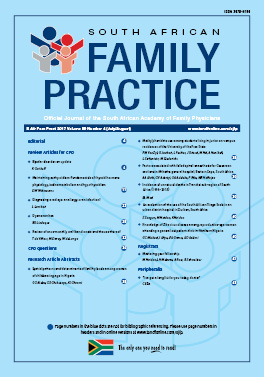Methylphenidate use among students living in junior on-campus residences of the University of the Free State
Keywords:
alcohol co-use, cognitive enhancement, methylphenidate, off-label prescribing, students
Abstract
Background: The use of methylphenidate as cognitive enhancer is a growing trend among students at tertiary institutions globally. This study aimed to determine the prevalence of methylphenidate use and co-use with alcohol among on-campus residence students of the University of the Free State (UFS). Methods: For this cross-sectional study, 10 junior residences were randomly selected and 1 761 anonymous questionnaires handed out for all students living in these residences during 2015. Data were collected on demographics, use of methylphenidate and co-use of methylphenidate with alcohol. Results: In total, 585 questionnaires (response rate 33.2%) were received and analysed. Sixty-six (11.3%) participants reported past-year use of methylphenidate. While only 18 (27.3%) of past-year users were diagnosed with ADHD, 44 (66.7%) obtained their supply through doctors’ prescriptions, 21 (31.8%) from friends without payment, and 4 (6.1%) bought it from illegal sources. Of the past-year users, 24.2% had used methylphenidate before consuming alcohol. Conclusion: Off-label prescribing, diversion of prescriptions and illegal trade in methylphenidate occur among students at the UFS. The frequent co-use of methylphenidate and alcohol may indicate a lack of information on the effects of the medication, rather than deliberate misuse. (Full text of the research articles are available online at www.medpharm.tandfonline.com/ojfp) S Afr Fam Pract 2017; DOI: 10.1080/20786190.2017.1292695
Section
Research Articles
By submitting manuscripts to SAFP, authors of original articles are assigning copyright to the South African Academy of Family Physicians. Copyright of review articles are assigned to the Publisher, Medpharm Publications (Pty) Ltd, unless otherwise specified. Authors may use their own work after publication without written permission, provided they acknowledge the original source. Individuals and academic institutions may freely copy and distribute articles published in SAFP for educational and research purposes without obtaining permission.

